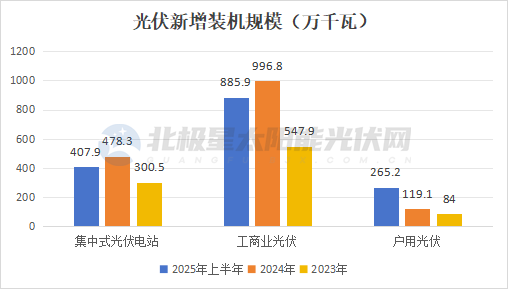行业新闻
Guangdong Halts Ground-Mounted Solar, Pivots to Rooftop PV
日期:2025-09-01 浏览次数:249
Guangdong "Wields the Knife" on Centralized Ground-Mounted Solar for Two Years
On August 27th, the Guangdong Provincial Energy Bureau issued the "Implementation Opinions on the Management Measures for the Development and Construction of Distributed Photovoltaic Power Generation (Draft for Public Comment)." It states, "In accordance with our province's reality of no longer developing centralized ground-mounted photovoltaic power generation and instead focusing on supporting rooftop photovoltaic development…" a statement that has sparked widespread discussion within the industry.
In fact, back in 2023, there were continuous reports that Guangdong had suspended the approval of ground-mounted centralized solar projects. However, the New Energy Division of the Guangdong Provincial Energy Bureau later told the media that there was no "one-size-fits-all" halt on project approvals.
Nevertheless, data from the Guangdong Provincial Investment Project Online Approval and Supervision Platform shows that almost no new centralized ground-mounted solar projects have been registered since 2024. Relevant developers in Guangdong have also confirmed that, in reality, ground-mounted centralized solar projects have not been approved since 2023.
This news has once again triggered heated debate. Polaris has confirmed the situation by calling the New Energy Division of the Guangdong Provincial Energy Bureau, where a staff member stated that Guangdong has not issued any related lists since 2023. Agro-photovoltaic and fishery-photovoltaic projects, which are classified as centralized projects, are also no longer being developed.
In reality, Guangdong's shift in attitude toward centralized ground-mounted solar was hinted at as early as 2022. That year, the Guangdong Provincial Development and Reform Commission issued a "Notice on Regulating the Management of Centralized Photovoltaic Power Generation Projects," which directly addressed a core industry problem: "The registered capacity of centralized photovoltaic power generation projects in Guangdong has grown dramatically, accumulating to over 90 GW. This severely deviates from the actual annual project starts and new grid-connected capacity, and is also inconsistent with our province's resource conditions, leading to a series of issues such as land grabbing, land speculation, and vicious competition."
The notice also mentioned that the registered capacity in Maoming, Meizhou, and Qingyuan had each exceeded 10 GW, while Zhaoqing, Heyuan, Huizhou, and Shanwei had each exceeded 6 GW, far surpassing their local grid absorption capacity.
Although the "Guangdong Provincial Implementation Plan for High-Quality Energy Development (2023-2025)," issued by the Guangdong Provincial Energy Bureau in May 2023, explicitly mentioned "adhering to both centralized and distributed development, vigorously developing distributed photovoltaic power, and building centralized photovoltaic power stations in a way that suits local conditions," actual grid-connection data shows that distributed solar development in Guangdong is outperforming centralized solar.
According to data from the National Energy Administration, in 2023, Guangdong’s centralized solar capacity increased by about 3 GW, with an additional 4.78 GW in 2024, and about 4 GW added in the first half of 2025. Most of these projects were based on previously issued quotas. (Guangdong’s 2023 development plan for centralized ground-mounted solar power stations issued a total of 82 projects with a capacity of 10.928 GW.)
In contrast, distributed solar development in Guangdong has been rapid, with the commercial and industrial sector leading the way. New commercial and industrial capacity reached 8.8 GW in 2023, nearly 10 GW in 2024, and approximately 5.5 GW in the first half of 2025.
This explosive growth is linked to the region's unique industrial advantages. The dense industrial parks, factories, and warehouses in the Pearl River Delta provide vast rooftop resources for distributed solar. The demand for green electricity from manufacturing companies and their sensitivity to electricity costs have created a closed-loop business model of "self-use and surplus-power-on-grid." According to data from the Guangdong Solar Association, in July alone, commercial and industrial solar projects in the province were registered for over 2 GW, showing immense development potential.
Overall, Guangdong's decision to stop developing centralized ground-mounted solar and focus on rooftop PV is an innovative approach for economically developed regions to solve the conflict between resource constraints and energy demand.









